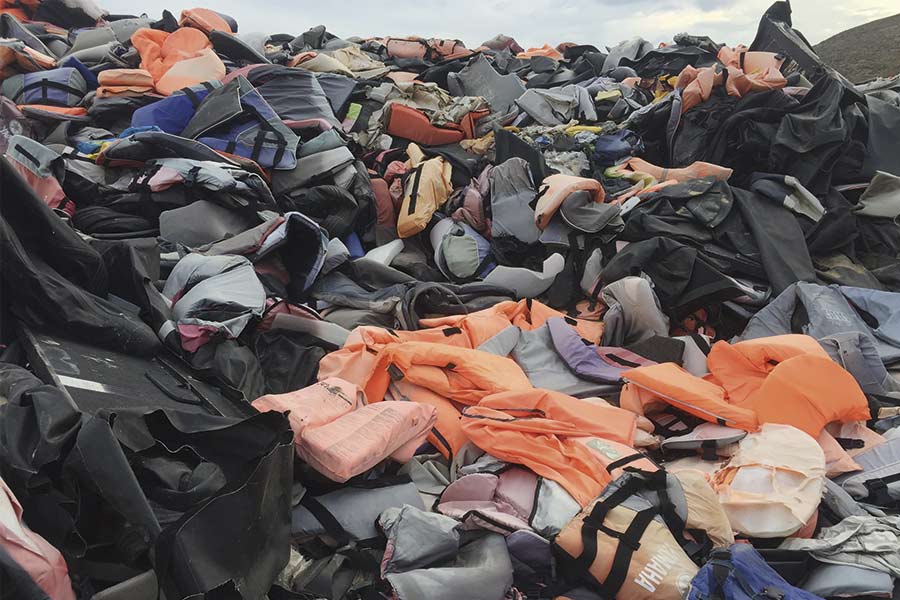Current Situation of Syrian Refugees in Turkey
Immigration seems to be making more headlines in recent years. As the world globalizes in terms of nations’ economies, trade and investment, borders are opened up more easily for freer flow of goods and products. People are supposedly freer to move around the world, too. At least that was the situation before the pandemic.
20/10/14 by Emine Zeybek

Picture by Julie Ricard
On the other hand, millions of people in different parts of the world are forced to leave their homes for various reasons. For example since the civil war Syria seeking safety in Turkey. Since the civil war in 2011, many Syrians have left their homeland and started living as refugees in different countries.
However, Turkey does not consider any of them “refugees” in the legal sense. Turkish officials were careful to refer to the refugees from Syria strictly as “guests,” lest they inadvertently suggest that the Syrians were “refugees” with Geneva Convention rights. In October 2011, government announce that it would consider them as people under temporary protection, and the use of the term “guests” came to be used less in both formal and informal discourse. Nevertheless, I found it appropriate to use «refugees» word in this article.
Most Syrian refugees have now built lives in Turkey. In fact, many manage to earn a living on their own. With the passage of time, more and more refugees will come to see Turkey as home. According to the latest data of 3 million 609 thousand 884 Syrian refugees living in Turkey.
The relationship between local people and refugees varies according to the situation. In this process where society caught unprepared, the state’s open-door policy towards Syrian Guderian immigration wait to be in such great numbers, too short to be of a mass migration to the preparatory process, it could not be created literally of adequate
resources and policies for immigrants, cultural differences between the Syrian refugees with Turkey’s society, language differences, etc. Over time, a great prejudice and reaction against Syrians arose in the society.
For example, some of people repeatedly complained that young Syrian men were relaxing in Turkey rather than fighting for justice in their homeland. As one respondent said, “ If there were a war in my country, I would join and not think twice about it.” I feel like a stranger in my own country”; “I never hear Turkish on the street anymore”; “they [the Syrians] receive more [state funding] than we do just for coming here”; “he [Erdoğan] takes from his own people and gives to the Syrians”; “first we let them in, and now they wage war [that is to say, commit crimes] against us. (CAP-sponsored focus groups in late 2017)
Those categories explain to raw emotions many Turks express about the refugees.
On the other hand, it is not uncommon for those who say that we cannot turn our backs on people in difficult situations and that we must do our best to help them.
In this migration process that has been going on since 2011 few Syrians intend to leave. According to a 2017 survey, 61 percent of Syrian refugees say that they would return only if the war ended and a “good” regime were in place in Syria; another 16 percent say they are “not thinking to go back at all.” Meanwhile, 13 percent say that they would return at the end of the war, no matter what type of regime is in place. And only 3 percent say they will return even without an end to the war.
When asked about their preferred status in Turkey, more than two-thirds of the refugees said they either wanted dual Syrian-Turkish citizenship or Turkish citizenship only.
While most Turks hope all the Syrians will eventually return to Syria, that prospect looks unrealistic; sizable numbers of Syrians are indeed likely to remain It is difficult to persuade people to resettle in a war-devastated area.
Returning Syrian refugees would face many daunting prospects in their homeland, starting with the challenges of finding a place to live and earning a living. Hospitals, schools, and basic services throughout much of Syria have been destroyed or are nonfunctional. There is also the possibility that the Assad regime or opposition groups will seek to exact revenge against male former refugees for fleeing, rather than staying and fighting.
To take a look at the lives of Syrian refugees from the other side of the story, most of them seem to have adjusted their lives to this new order. Children continue their education in public schools, while adults work in different business lines. Although many of them lost their communication with their old friends in this long and complicated journey, those who managed to overcome the language barrier try to establish good relations with the local people.
As previously mentioned, Syrian students are being integrated into Turkish public schools. Meanwhile, Syrians are being integrated increasingly into the Turkish economy. However, the situation of the refugees continues to remain uncertain.

Picture by Aina Dalet
Refugees staying in camps during the pandemic
The situation of refugees all over the world is even more difficult especially during this pandemic period. According to the news by Fabian Goldman, published on Perspective.eu ;
For 20,000 people, only 3 doctors currently attend the health center operated by the Greek Ministry of Health.
Widespread curfews have been declared as part of the fight against corona in the busy areas of the EU-operated Leros and Kos Islands. Refugees are no longer allowed to leave the overcrowded camps. In Chios, Samos and Leros Islands, only one person per family can leave the camp between 7 am and 7 pm to go shopping. After charities have withdrawn their employees in the past few weeks, people are largely left on their own.
It is clear that the refugee problem, which could not be solved due to measures not taken before the pandemic and constant diplomatic disputes, has become more complex with the pandemic.
I wish to express appreciation to the following individuals for conversations/information that added immensely to my knowledge of the issues discussed here:
Alan Makovsky(for the info of survey) and 3 Syrian refugees who choose to keep their names anonymous. Thanks for helping me.
